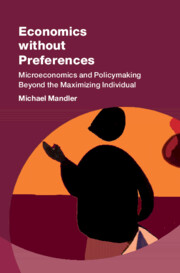Book contents
- Frontmatter
- Contents
- Figures
- Preface
- 1 Introduction: Marginal Utility Matters
- Part I Trade-Offs and Rationality
- Part II Economic Analysis and Policy Without Preferences
- 7 Marginal Utility and the Volatility of Prices
- 8 The Trouble with Welfare Economics
- 9 Welfare and Policymaking: Pareto without Preferences
- 10 Utilitarianism without Utility
- 11 Production and the Enforcement of Rationality
- 12 Conclusion: Custom and Flexibility
- Appendix
- Bibliography
- Index
12 - Conclusion: Custom and Flexibility
from Part II - Economic Analysis and Policy Without Preferences
Published online by Cambridge University Press: 02 January 2025
- Frontmatter
- Contents
- Figures
- Preface
- 1 Introduction: Marginal Utility Matters
- Part I Trade-Offs and Rationality
- Part II Economic Analysis and Policy Without Preferences
- 7 Marginal Utility and the Volatility of Prices
- 8 The Trouble with Welfare Economics
- 9 Welfare and Policymaking: Pareto without Preferences
- 10 Utilitarianism without Utility
- 11 Production and the Enforcement of Rationality
- 12 Conclusion: Custom and Flexibility
- Appendix
- Bibliography
- Index
Summary
When preferences are incomplete, an agent or policymaker cannot order options from best to worst. Decisions and policymaking are then slanted in favor of the status quo. Individuals and institutions are governed by customary decisions, until a new option appears that allows for an unambiguous improvement. The reshaping of preferences provides a rarely explored escape hatch to this conservatism and is illustrated by how the flexibility of preferences can cure Baumol’s cost disease (low productivity growth in services).
- Type
- Chapter
- Information
- Economics without PreferencesMicroeconomics and Policymaking Beyond the Maximizing Individual, pp. 223 - 224Publisher: Cambridge University PressPrint publication year: 2025

